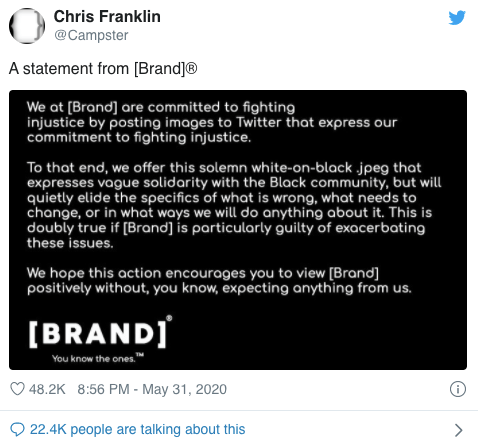In 2016, the Census Bureau reported that the majority of U.S. businesses were “small, relatively new, and owned by white Americans.”
While it’s possible there has been a large influx of minority-owned businesses opening in the last 4 years, the more likely reality is that white people still run the majority of workplaces in the U.S.
Which leads us to the responsibility of these businesses at a time like this.
The country is reeling from the brutal murders of Black Americans at the hands of police– most recently, Ahmaud Arbery, Breonna Taylor, Tony McDade, and George Floyd.
And meanwhile we’re celebrating the successes of the Black Lives Matter protests around the country and the world, from Minneapolis disbanding their police department, to New York banning the state law that keeps officers’ disciplinary records secret, to the Miami police banning the chokehold.
So what is the role of white (or non-Black) business owners in light of these changes and this movement? To make a donation? A statement? Does a statement even do anything? How can you stay “on brand” if your business has nothing to do with politics or police?
First things first: anti-racism should ALWAYS be on brand
In the past few weeks, you may have read the phrase “It is not enough to not be racist. You must be anti-racist.”
That’s because racism isn’t just “good ole boys” with confederate flags on their trucks or restaurants overtly seating Black couples and families away from the windows.
Racism runs rampant in American society, culture, and structure — from our education system to our justice system.
It affects the way BIPOC (Black/indigenous/people of color) shop, travel, eat, study, and just live their daily lives.
That’s why anti-racism should be your business’ goal, whether you’re selling food, exercise equipment, services, or anything else.
But there’s been some hesitance on the part of small companies and brands to show their solidarity for current protests or accept their responsibility to speak out.
I’ve been surprised and disappointed to see many small businesses and Instagram influencers on my timeline posting as if life were going on as normal (or, at least, coronavirus normal).
Of course it’s not fair to generalize — there have also been amazing small companies from around the country using their position to uplift Black voices and anti-racism efforts.
A few examples:
-
Nikki Carter, a brand strategist and writer has been sending out a myriad of action items and anti-racism resources via her weekly newsletter for women of color (it’s awesome — you should subscribe here).
-
Local Memphis bookstore Novel. shared a list of anti-racist reads and how to access them when they’re being so sought after (which is a good thing!).
-
Design-oriented PR firm Consultancy PR out of Los Angeles acknowledged underrepresentation of BIPOC in the design industry in an Instagram post by pledging to offer pro-bono counsel to BIPOC-led businesses.
But on the whole, it seems that big businesses have been better about acknowledging the protests and the issues that sparked them … at least, on the surface.
Big brands just paying lip service to the movement
A recent Morning Consult poll found that adult consumers of all races want companies to make a statement one way or another about the protests, and that staying silent would actually have a negative impact on their view of the companies.
And big companies have had seemingly no problem making generic statements against racism, regardless of their company’s own practices.
A short list of companies who made statements pretty quickly after the protests started include:
- Nickelodeon
- Ben & Jerry’s
- Sephora
- Bank of America
- Netflix
- Nike
- YouTube
- 23andMe
- Bombas
But as this Atlantic article points out, “Instead of taking concrete actions, many companies interpret consumers’ push for social responsibility as a strong desire for them to make vague statements about even vaguer values, such as ‘equality’ and ‘community,’ when something racist dominates the news.”
And obviously, the Internet was quick to turn to satire.

Some multinational corporations have put their money where their mouth is. But people have been quick to point out the hypocrisy of making grand PR gestures while quietly supporting racist institutions in their everyday business practices.
- When L’Oreal recently tweeted about “speaking out against ‘injustices,’” model Munroe Bergdorf, a Black trans woman, called out the makeup conglomerate on Twitter. She reminded everyone that L’Oreal was quick to terminate their contract with her after she posted about the white-supremacist rally in Charlottesville back in 2017. (She will now be rejoining the UK L’Oreal diversity and inclusion advisory board.)
- Amazon has frequently been accused of taking advantage of its workers while its CEO is on his way to becoming the world’s first trillionaire. But lately, as the behemoth company added a “Black Lives Matter” banner on Twitter, more accusations have surfaced to remind audiences that Amazon still provides data and video surveillance to law-enforcement agencies.
- Bank of America has pledged $1billion to help minority communities fight racial inequality. This is a gesture that seems at odds with their policy of supporting the private prison industry (which has even greater rates of racial disparity than publicly-run prisons), which they ended in 2019.
- The beloved children’s channel Nickelodeon aired 8 minutes and 46 seconds of breathing over a black screen with the words “I can’t breathe.” But just a few days later, a top official resigned over accusations of “anti-Blackness within the organization.”
-
Ben & Jerry’s, whose founders have been doing activist work for years, released a statement calling out white supremacy and released a new line of politically-charged ice cream flavors. However, Palestinian activists have also called for a boycott of Ben & Jerry’s products over their support for the same policies of policing and incarceration in Israel that they decry in the US.
What CAN you do?
What CAN you do?
What CAN you do?
So if you shouldn’t stay silent, but you also shouldn’t say something without any meaning behind it, what should your company do?
Put in
the work.
This Drum article quotes co-founder of activist campaign 56 Black Men as saying, “Now is not the time to be silent, neither is it the time to jump on a bandwagon.
It’s a time for real reflection and care with regards to how a brand and its leaders stand by the Black community at this time and move forward with real steps to end racism and injustice globally and not only on the streets but in their organizations too.
Organizations can not promise that their staff are not racist, but they can promise that they will not tolerate it.”
So how can we do that?

Money speaks.
At the very least, make a donation to an organization where it will count. Some examples include the NAACP Legal Defense Fund, the official Black Lives Matter group, and bail funds around the country. (Honestly, just google “where to donate.”)
As Bryce Roberts, the founder of Indie VC, puts it, “If you’re an investor, founder or manager in tech wondering what you can do to effect change, here’s the uncomfortable answer: Make the hire. Write the check. Don’t host a dinner. Don’t weigh in on a panel. Don’t change your profile picture. Make the hire. Write the check.”
Acknowledge white supremacy — especially with your team.
Find a list of resources to read, watch, listen to, and learn from about white supremacy in your daily life and how to become serious about anti-racism. Here’s a good guide to get started.
But please — DO NOT rely on BIPOC to “teach” you about white supremacy or how to be a good ally. Just do the work.
Hold your company accountable.
- Work with your team to examine your company’s hiring practices.
- Have a discussion about diversity in management, specifically.
- End your company’s contracts with law enforcement.
- Take a stand against microaggressions, and require all employees to take part in racial bias training.
- Give BIPOC employees real spaces to give feedback about their experiences without repercussions (if they so choose).
As this restaurateur/activist couple put it,
”If you can’t publicly speak out against racism using the same platforms you speak on everything else, we can’t work. … Stand with us or stand over there!








